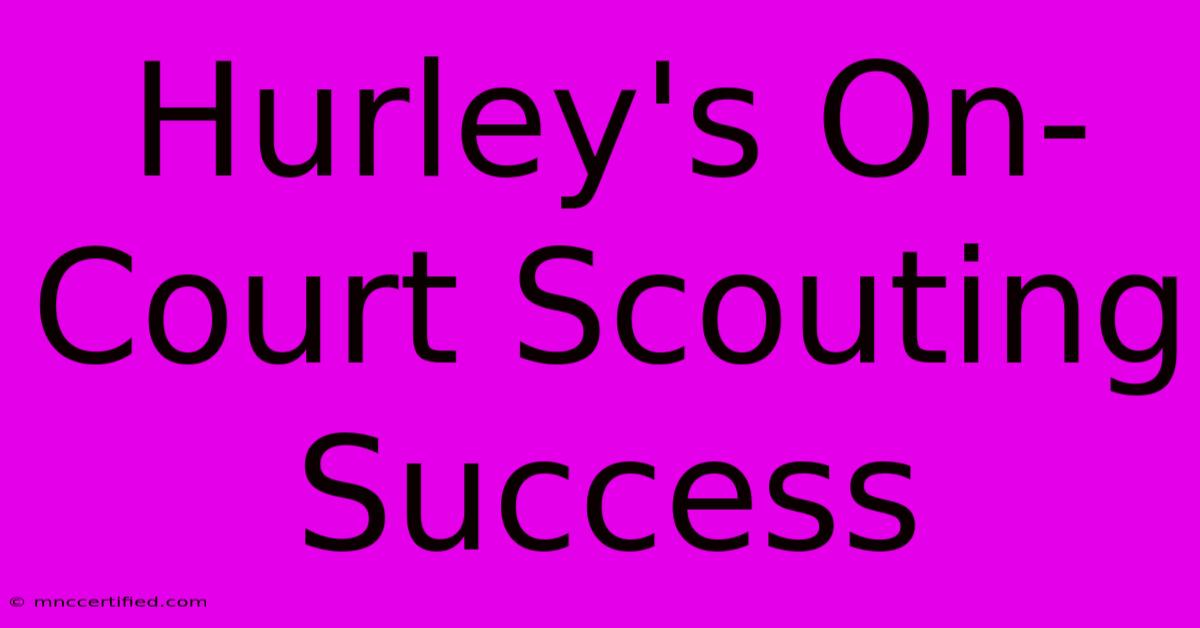Hurley's On-Court Scouting Success

Table of Contents
Hurley's On-Court Scouting Success: A Deep Dive into His Methodology
John Hurley's name might not be a household one, but within the intricate world of basketball scouting, his success speaks volumes. This article delves into the strategies and methodologies that have cemented Hurley's reputation as a top-tier on-court scout, exploring what makes him so effective and offering insights for aspiring scouts.
Understanding the Role of an On-Court Scout
Before diving into Hurley's specific techniques, let's establish the importance of on-court scouting. Unlike analysts who primarily rely on film study, on-court scouts gain a unique, real-time perspective of a player's abilities, work ethic, and intangibles. They witness firsthand the nuances of a player's game that might be missed on film – the intensity of their defensive pressure, their communication with teammates, and their reaction to pressure situations. This live observation is crucial for a comprehensive evaluation.
Key Traits of a Successful On-Court Scout
Several key traits contribute to a successful on-court scout. Hurley exemplifies many of these:
- Keen Observation Skills: The ability to pick up on subtle details, like body language, footwork, and decision-making under pressure, is paramount.
- Deep Basketball Knowledge: A strong understanding of the game's intricacies, strategies, and player development pathways allows for better context in evaluations.
- Objectivity and Critical Analysis: The ability to separate personal biases from objective assessment is crucial for accurate reporting.
- Effective Communication Skills: Clearly conveying findings and insights to coaches and management is vital for informing player selection and development.
- Adaptability and Flexibility: Scouting assignments vary, requiring the ability to adjust to different playing styles, team strategies, and environments.
Hurley's Unique Scouting Approach: A Case Study
While the specifics of Hurley's methodology aren't publicly available, we can infer key aspects based on his consistent success:
Focus on Intangibles:
Many scouts focus heavily on quantifiable stats. Hurley's success suggests a strong emphasis on intangibles – a player's character, work ethic, coachability, and competitive spirit. These qualities, often harder to measure, can be critical to a player's long-term success and team fit. His reports likely emphasize observations like a player's leadership qualities, their reaction to adversity, and their interactions with teammates and coaches.
Holistic Player Evaluation:
Hurley likely avoids focusing solely on individual skills. He probably assesses players within the context of the game, observing their contributions to the team's overall strategy and performance. This holistic approach leads to a more comprehensive understanding of a player's potential.
Comprehensive Reporting:
Hurley's reports are likely detailed and well-structured, providing clear, concise observations and insightful analysis. He likely goes beyond simply listing strengths and weaknesses, offering nuanced perspectives and context to support his conclusions. This thoroughness is vital for informed decision-making by coaching staff.
Lessons for Aspiring Scouts
Hurley's success offers valuable lessons for anyone looking to break into basketball scouting:
- Develop your observational skills: Practice actively watching games, focusing on details beyond the box score.
- Build your basketball knowledge: Immerse yourself in the game, studying strategies, player development, and scouting reports from experienced professionals.
- Network with experienced scouts: Seek mentorship and guidance from established scouts to learn best practices and refine your skills.
- Practice objective analysis: Develop the discipline to separate your personal opinions from objective evaluations.
Conclusion: The Legacy of On-Court Scouting Expertise
John Hurley's success as an on-court scout underscores the crucial role of live observation in player evaluation. His likely emphasis on intangibles, a holistic approach, and comprehensive reporting demonstrates a sophisticated scouting methodology that delivers tangible results. By studying the principles implied by his success, aspiring scouts can develop their skills and advance their careers in this demanding but rewarding field. The ability to identify hidden gems and accurately assess a player's potential remains crucial for building winning teams – a legacy Hurley exemplifies.

Thank you for visiting our website wich cover about Hurley's On-Court Scouting Success. We hope the information provided has been useful to you. Feel free to contact us if you have any questions or need further assistance. See you next time and dont miss to bookmark.
Featured Posts
-
Son Fiance Adeles Final Show Message
Nov 26, 2024
-
Lopeteguis Surprise Newcastle Tactic Report
Nov 26, 2024
-
Michigan Doe Taken Steve Griffin
Nov 26, 2024
-
Glasgow Stadium Lana Del Rey Live
Nov 26, 2024
-
Thanksgiving Snow Forecast Impact
Nov 26, 2024